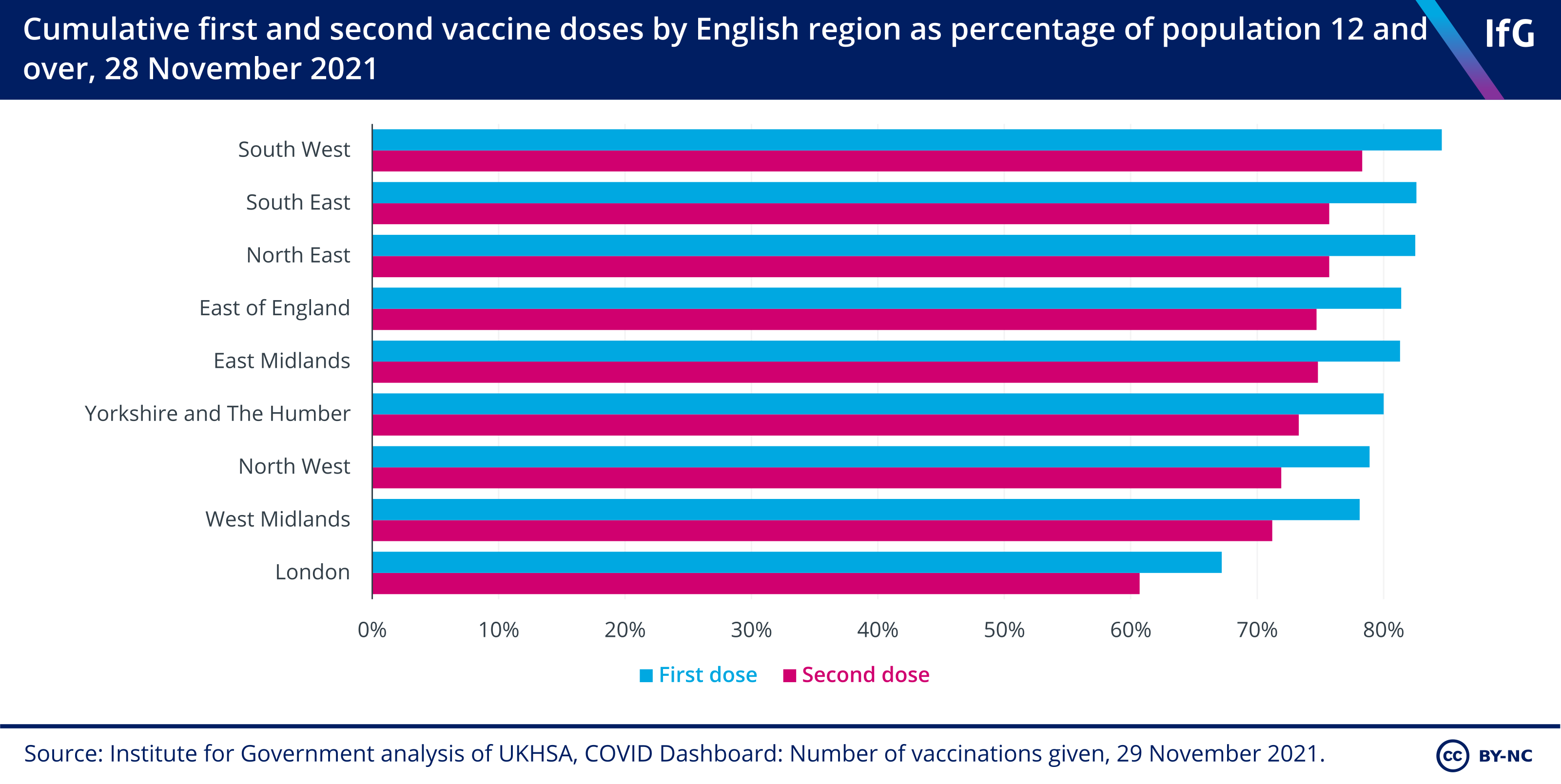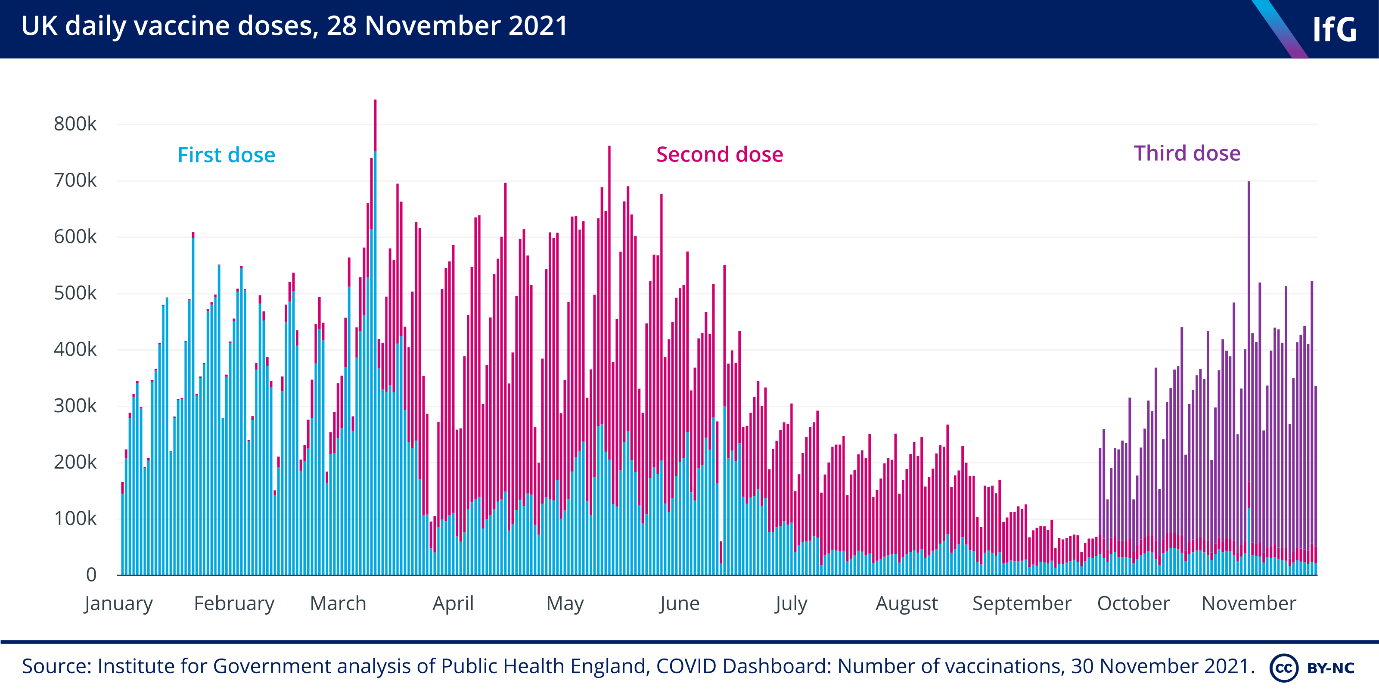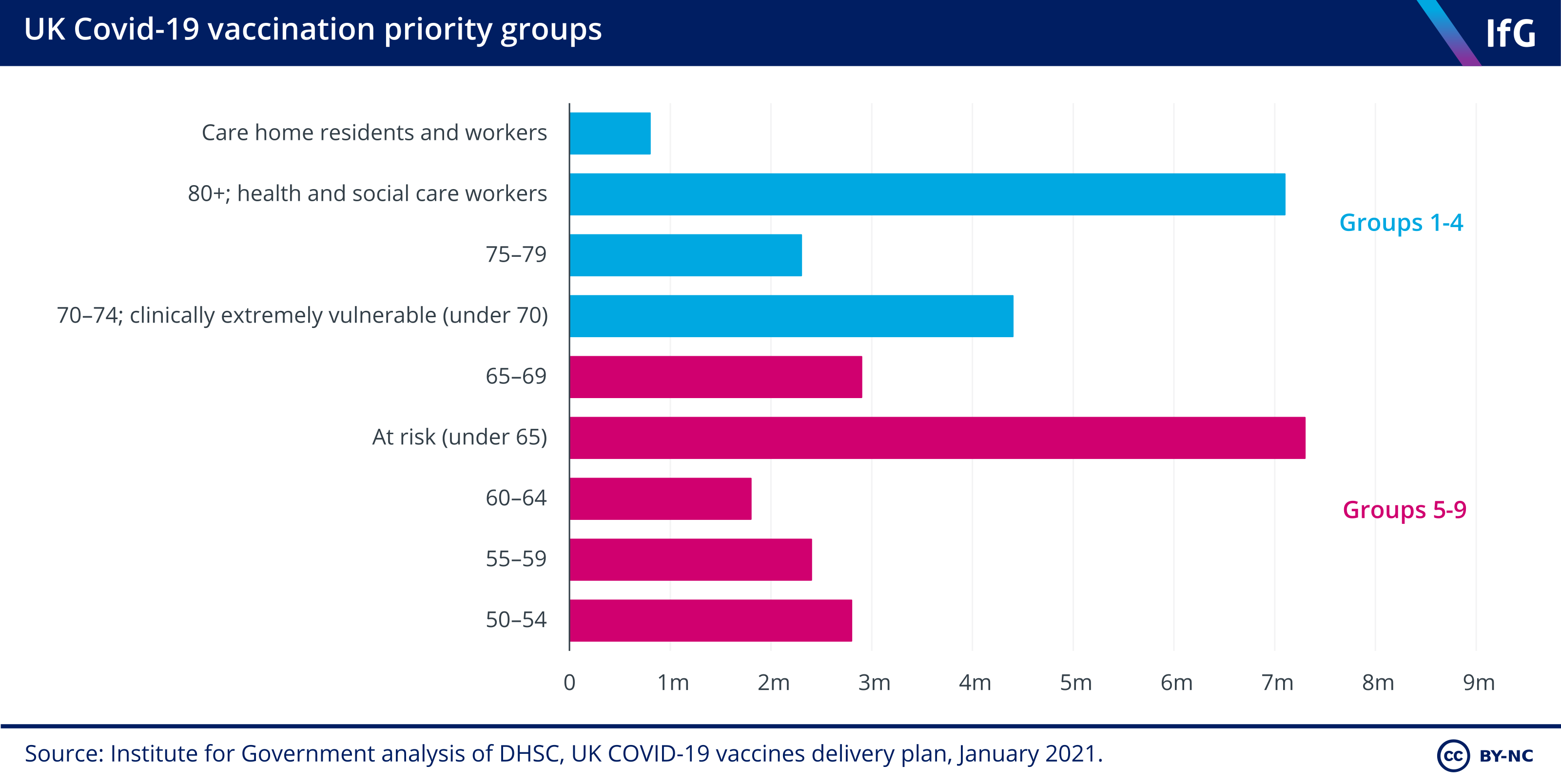Coronavirus vaccine rollout
The vaccine rollout is the responsibility of the Department of Health and Social Care (DHSC).

Who is responsible for the vaccine rollout?
Purchasing vaccines and R&D falls under the Department for Business, Energy and Industrial Strategy (BEIS) and the Vaccine Task Force. The rollout is the responsibility of the Department of Health and Social Care (DHSC), working with NHS England, NHS Improvement and the UK Health Security Agency (which replaced the now defunct Public Health England in October 2021) to co-ordinate and monitor vaccinations across a large network of vaccination sites including in hospitals, GP surgeries and pharmacies.
In December 2020, the prime minister appointed Nadhim Zahawi as the minister responsible for Covid vaccinations, based in the health department. He was promoted to education secretary at the September 2021 reshuffle and the post was not replaced. The prime minister and Sajid Javid, health secretary since June 2021, have oversight of the ongoing programme.
Which vaccines have been approved in the UK?
On 2 December 2020, the Pfizer-BioNTech Covid-19 vaccine was approved for use in the UK, becoming the first to be authorised anywhere in the world. This was followed on 30 December by the cheaper and easier-to-distribute Oxford-AstraZeneca vaccine.
A third vaccine, produced by Moderna, was approved for use in the UK in January 2021. Finally, Janssen’s single-dose vaccine was approved in May 2021, although it is yet to be used.[1]
How much vaccine has the UK ordered?
Bu December 2021 UK had ordered more than 650m doses of eight vaccines (it has bought several vaccines prior to their approval). It has ordered most – 189m, around a third of the total – of the Pfizer vaccine.[2]
The government’s purchasing strategy is widely regarded to have been a success, securing high volumes of the vaccines approved most quickly and ensuring some can be produced in the UK. It provided considerable support to the Oxford vaccine, including through research funding.
Some have, however, criticised some vaccine procurement decisions, including the cancellation of a contract with Valneva to produce vaccines in Scotland. Others, including former prime minister Gordon Brown, have also challenged the UK’s number of vaccine orders at a time when many countries still have low vaccination rates.[3]
What is the government's plan for the vaccine rollout?
In December 2020, the government published a list of nine priority groups, following the advice of the independent Joint Committee on Vaccination and Immunisation (JCVI). The rollout started with the most vulnerable and then moved down through age groups and risk levels.[4]
In September 2021, the government confirmed it would begin to offer vaccines to 12–15 year olds, and, with some evidence emerging suggesting the potential of waning immunity from vaccination, begin a programme of ‘booster’ vaccines for the priority groups identified in the original rollout.
In November 2021, amid concern about the new Omicron variant, the government announced boosters would be extended to all UK adults from three months after their second dose, with the aim of offering all adults a booster by the end of January 2022. This was brought forward by a month on 12 December.[5] Boosters will in most cases be either the Pfizer or Moderna vaccines, regardless of the first vaccine received.
From March 2022 people over 75, care home residents and those with weakened immune systems will also be able to book a fourth jab. A wider booster programme for all adults is expected in the autumn.[6]

There were some criticisms of complacency during summer and autumn 2021. Countries initially behind on vaccination rates, such as France and Spain, overtook the UK on the share of total population vaccinated. Some suggested that a willingness to use stronger measures to encourage vaccination, such as ‘Covid passports’ and vaccine mandates, might be a factor, with a significant increase in vaccinations after France announced its Covid passport plan, for example. However, robust evaluations are yet to be carried out and the UK’s later start on vaccinating children has also had a significant impact.[9]
The government was criticised for being slow off the mark with plans for vaccinating teenagers and rolling out boosters and for the design of the booster programme, with an inflexible booking system and a smaller role for GP surgeries. It launched a national advertising campaign, recalled the former head of England’s coronavirus vaccine delivery programme to lead the booster rollout, and adjusted the booking system.[10] Throughout November the number of doses administered daily rose, averaging around 2.5m a week by the end of the month.
Increasing emphasis was put on the booster rollout with the emergence of the Omicron variant, with the prime minister suggesting that the aim is to achieve an ambitious 1m vaccinations a day, significantly higher than the roughly 4m vaccinations a week seen in spring 2021.[11] This was achieved towards the end of December.[12]

With all remaining restrictions lifted, the government faces the ongoing difficulty of building vaccine confidence in all communities, and of reassuring individuals about safety and risks versus benefits in all age groups. It must also balance competing priorities, such as how much vaccine to use for the UK’s booster campaign versus how much to share with developing countries, where vaccination rates remain very low. The emergence of the Omicron variant, first discovered in South Africa, has emphasised the potential risks of inadequate vaccine sharing worldwide.
- ‘Coronavirus (COVID-19) vaccines’, NHS, 25 November 2021, www.nhs.uk/conditions/coronavirus-covid-19/coronavirus-vaccination/coronavirus-vaccine/
- Rough E, Powell T, ‘Coronavirus: Covid-19 vaccine roll-out frequently asked questions’, House of Commons Library CBP 9801, https://researchbriefings.files.parliament.uk/documents/CBP-9081/CBP-9081.pdf; ‘Covid vaccine: How many people are vaccinated in the UK?’, BBC News, 27 November 2021, www.bbc.co.uk/news/health-55274833; Department of Health and Social Care, ‘Government agrees new deals to future proof vaccine rollout in light of new variant’, Gov.uk, 2 December 2021, www.gov.uk/government/news/government-agrees-new-deals-to-future-proof-vaccine-rollout-in-light-of-new-variant
- Smyth C, ‘Britain “unprepared for more dangerous strains”’, The Times, 30 November 2021, www.thetimes.co.uk/article/britain-unprepared-for-more-dangerous-strains-r8ngc5wk8; Smyth C, ‘Kate Bingham says Britain is “put at risk by civil service groupthink”’, The Times, 23 November 2021, www.thetimes.co.uk/article/kate-bingham-says-britain-is-put-at-risk-by-civil-service-groupthink-xqmhztc6p; Brown G, ‘A new Covid variant is no surprise when rich countries are hoarding vaccines’, Guardian, 26 November 2021, www.theguardian.com/commentisfree/2021/nov/26/new-covid-variant-rich-countries-hoarding-vaccines
- Department of Health and Social Care, UK COVID-19 vaccines delivery plan, 11 January 2021, https://assets.publishing.service.gov.uk/government/uploads/system/uploads/attachment_data/file/951284/UK_COVID-19_vaccines_delivery_plan.pdf
- Department of Health and Social Care, Young people aged 12 to 15 to be offered a COVID-19 vaccine, Press Release, 13 September 2021, www.gov.uk/government/news/young-people-aged-12-to-15-to-be-offered-a-covid-19-vaccine; Department of Health and Social Care, ‘Most vulnerable to be offered COVID-19 booster vaccines from next week’, Press Release, 14 September 2021, www.gov.uk/government/news/most-vulnerable-to-be-offered-covid-19-booster-vaccines-from-next-week; Cookson C, Barnes O, Burn-Murdoch J, ‘Why are Covid vaccine boosters needed and who in the UK will receive them?’, Financial Times, 14 September 2021, www.ft.com/content/cf83b3a1-fe06-4c9f-999c-7500090aee7c; UK Health Security Agency, ‘JCVI advice on COVID-19 booster vaccines for those aged 18 to 39 and a second dose for ages 12 to 15’, Press Release, 29 November 2021, www.gov.uk/government/news/jcvi-advice-on-covid-19-booster-vaccines-for-those-aged-18-to-39-and-a-second-dose-for-ages-12-to-15
- BBC News, Covid: Spring booster jab launches for over-75s and high risk in England, 21 March 2022, www.bbc.co.uk/news/health-60795121; UK Health Security Agency, JCVI advises a spring COVID-19 vaccine dose for the most vulnerable, 21 February 2022, www.gov.uk/government/news/jcvi-advises-a-spring-covid-19-vaccine-dose-for-the-most-vulnerable
- Vaccinations in the United Kingdom, 14 September 2021, https://coronavirus.data.gov.uk/details/vaccinations
- Office for National Statistics, Coronavirus (COVID-19) latest insights: Vaccines, 13 September 2021, www.ons.gov.uk/peoplepopulationandcommunity/healthandsocialcare/conditionsanddiseases/articles/coronaviruscovid19latestinsights/vaccines#vaccinations; Our World in Data, Coronavirus (COVID-19) Vaccinations, 13 September 2021, https://ourworldindata.org/covid-vaccinations; Office for National Statistics, Coronavirus and vaccination rates in people aged 70 years and over by socio-demographic characteristic, England: 8 December 2020 to 11 March 2021, 29 March 2021, www.ons.gov.uk/peoplepopulationandcommunity/healthandsocialcare/healthinequalities/bulletins/coronavirusandvaccinationratesinpeopleaged70yearsandoverbysociodemographiccharacteristicengland/8december2020to11march2021
- Our World in Data, Coronavirus (COVID-19) Vaccinations, 13 September 2021, https://ourworldindata.org/covid-vaccinations; Keay L, Rao G, ‘COVID-19: Why has the UK vaccine rollout slowed and which countries have overtaken it?’, 15 September 2021, https://news.sky.com/story/covid-19-why-has-the-uk-vaccine-rollout-slowed-and-which-countries-have-overtaken-it-12406903
- Cookson C, Barnes O, Burn-Murdoch J, ‘Why are Covid vaccine boosters needed and who in the UK will receive them?’, Financial Times, 14 September 2021, www.ft.com/content/cf83b3a1-fe06-4c9f-999c-7500090aee7c; Barnes A, Neville S, Burn-Murdoch J, ‘Health leaders accuse ministers of bungling rollout of UK Covid booster jab’, Financial Times, 22 October 2021, www.ft.com/content/1f57838a-24d2-40d5-b314-2d8345a6e001
- ‘Booster campaign to be put 'on steroids' – government’, BBC News, 30 November 2021, www.bbc.co.uk/news/live/59473695
- GOV.UK, Vaccinations in the United Kingdom, https://coronavirus.data.gov.uk/details/vaccinations

How is the rollout going?
The initial phase went well. The government rolled out vaccinations very fast compared to other countries and hit its target of offering the vaccine to all adults by July 2021. Take-up has been high. By March 2022, 91.7% of the population aged 12 and over had received a first vaccine dose, 85.8% had received both doses and 67.2% had had a booster or third dose.[7]
The government succeeded in building vaccine confidence and managed to reach a large number of people, although take-up remains lower in some groups and regions. Take-up has been similar across the four nations, although Northern Ireland was slightly behind on booster doses as of 28 November 2021.[8]
- Topic
- Coronavirus
- Keywords
- Health
- Administration
- Johnson government
- Department
- Department of Health and Social Care
- Public figures
- Nadhim Zahawi
- Publisher
- Institute for Government